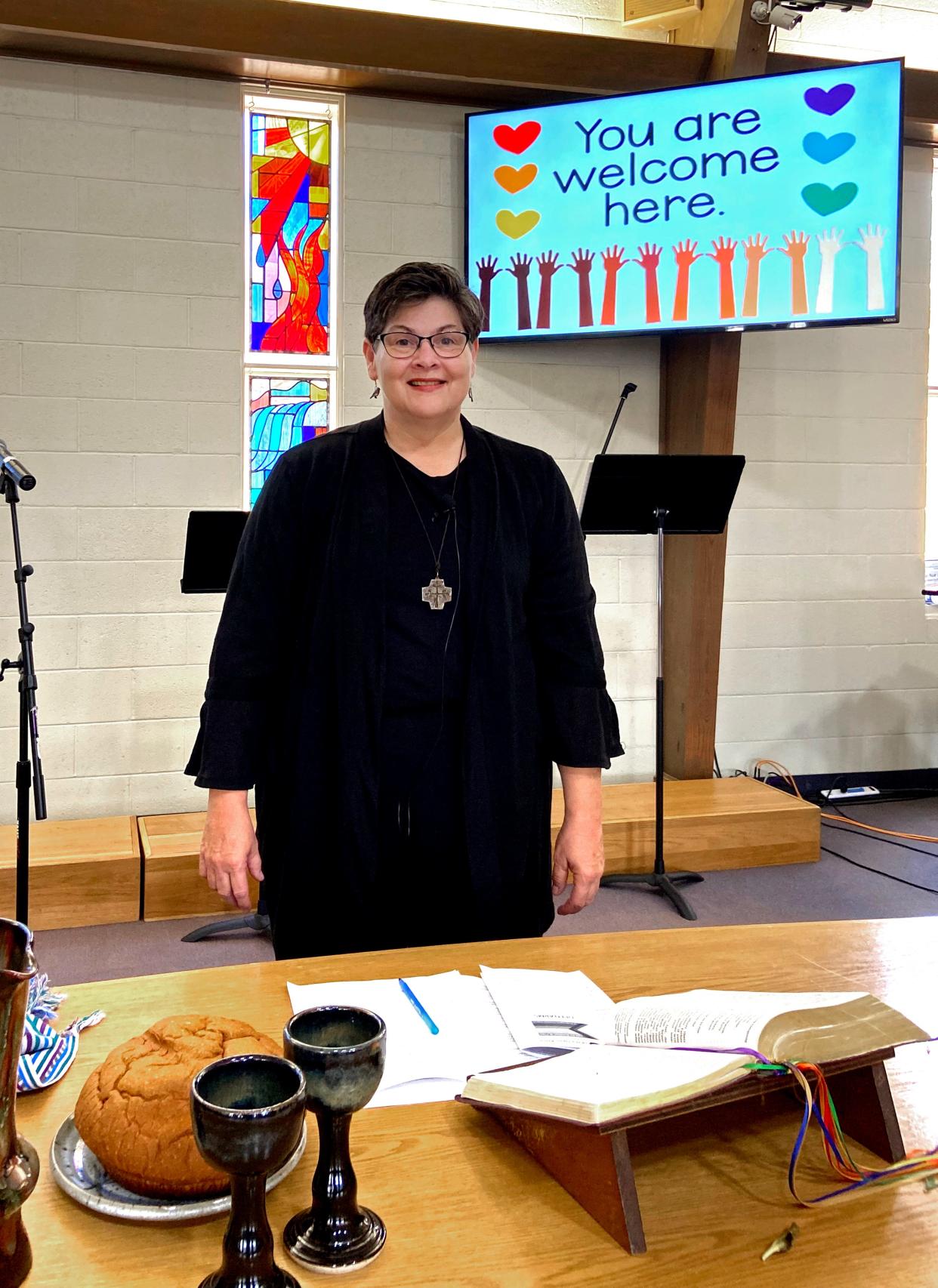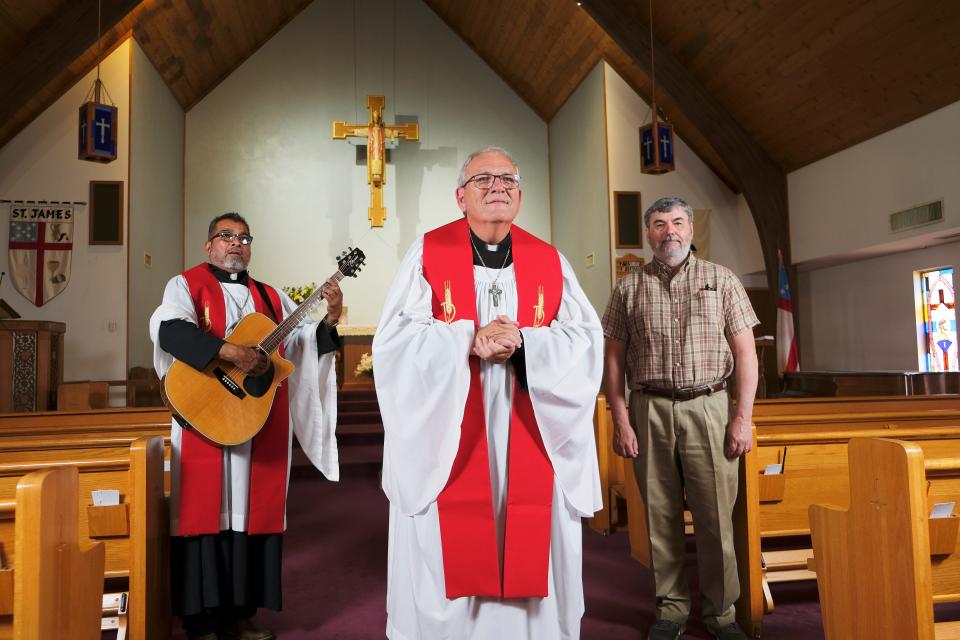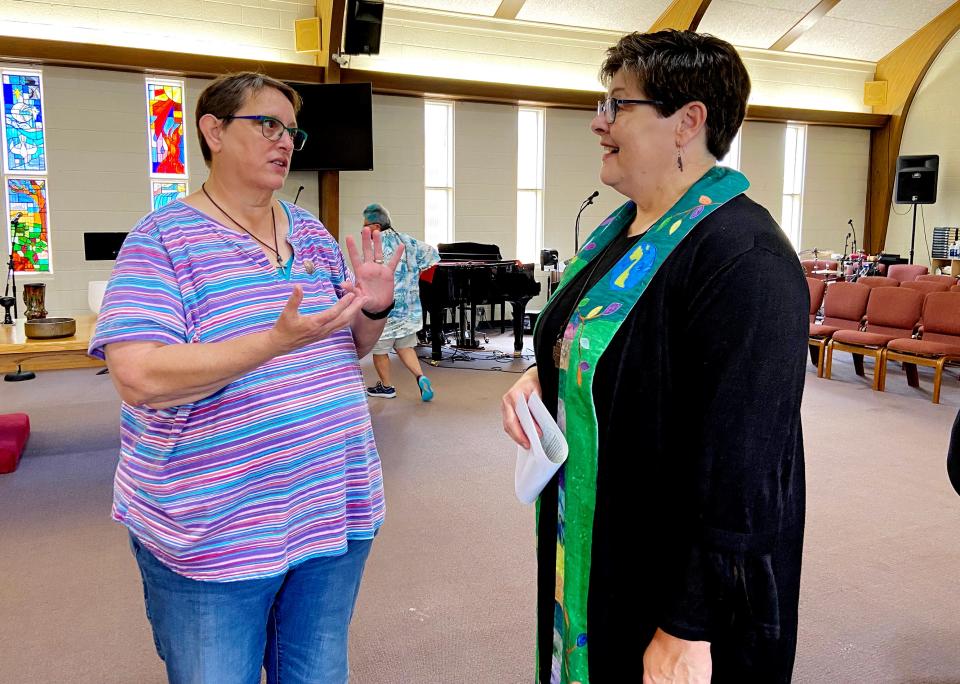From frustration to threats to peace, members describe what it feels like when a church splits

The words to an iconic Elton John song seemed appropriate as an Oklahoma City congregation began a recent worship service featuring a beloved guest preacher.
"Don't you know I'm still standin' better than I ever did? Lookin' like a true survivor, feelin' like a little kid. And I'm still standin' after all this time. Pickin' up the pieces of my life without you on my mind. I'm still standin,' yeah, yeah, yeah."
The Rev. Kathy McCallie seemed to embody the bold message of the anthem's chorus on May 21 as she walked up to the altar at Church of the Open Arms, 3131 N Pennsylvania.
On that day, McCallie, 63 — at the request of the church's senior pastor, the Rev. Kayla Bonewell — served as the visiting minister at the church she founded in 1997, after walking away from the United Methodist Church.
More: What we know: Oklahoma churches seeking to cut ties with United Methodist denomination
McCallie became a trailblazer when she took a stance in favor of same-sex marriage in the United Methodist Church.
She was serving as pastor of Epworth United Methodist Church in Oklahoma City when she officiated at the "holy unions" of two same-sex couples. Her actions defied the United Methodist Church's Book of Discipline, which prohibits the denomination's ministers from presiding at such unions. After the Oklahoma United Methodist Conference received two complaints against her, McCallie decided to resign from her ministry post and withdraw from the denomination.
She recently reflected on the latest developments in the United Methodist Church. The schism taking place within the denomination is primarily due to disagreements over same-sex marriage and gay ordination, plus other doctrinal matters, the penalties for violating the faith group's Book of Discipline and church leaders' perceived inability to uphold the policy book.
The current unfolding schism didn't come as a shock to the minister.
"I am not surprised, but I am sad," she said of the splintering faith group. "It is shocking that so little has changed in the United Methodist Church on this issue since I left in 1997. The world is moving on."
What are some other church splits?
The issues of same-sex marriage and gay clergy have riven many churches in Oklahoma and across the country.
A majority of members of First Presbyterian Church of Enid voted to sever ties with the Presbyterian Church (USA) in October 2011 over disagreements over core scriptural issues of gay ordination and same-sex relationships. Church members who decided to leave formed a new church called Westminster Presbyterian in Enid, which eventually merged with West Willow Community Church to become known as Westminster Church, affiliated with the Evangelical Presbyterian Church.
Peace Lutheran, 2600 E Danforth Road, voted in May 2011 to terminate its relationship with the Evangelical Lutheran Church in America (ELCA), the largest Lutheran denomination in the country, over the same reasons. Church members voted to become part of the North American Lutheran Church, a denomination created by others disenchanted with the ELCA. At the time, a Peace Lutheran leader said the ELCA's churchwide assembly in August 2009 had “raised the red flag” to church members regarding the denomination's perceived shift away from Scripture. At that time the denomination's leaders voted to allow pastors in same-sex relationships to be ordained and serve in the denomination.
Most of the congregation at St. James Episcopal Church, 8400 S Pennsylvania, ended their affiliation with the Episcopal Church USA in 2004. The departing members formed St. James Anglican Church and met at 204 SW 104. The church's name was changed to Christ Our Redeemer Anglican Church and is affiliated with the Anglican Church in North America.
Scott Sublett, a member of the church, said before most of the congregation headed for the exit doors, he was invited to a vestry meeting in 2003 where he learned that some church members were upset that the Rev. V. Gene Robinson had been elected bishop of New Hampshire despite being openly gay. Shortly afterward, another meeting was held, this one with more church members, but without some of the vestry or priests.
Sublett learned that some at the meeting were frustrated because, in August 2003, the Rt. Rev. Robert M. Moody, then-bishop of the Episcopal Diocese of Oklahoma, voted to confirm Robinson as bishop during an Episcopal General Convention in Minneapolis.
Sublett said the conversation then took a turn.
"I don't think it was their plan, but all of a sudden they started getting enthused about moving out of St. James," Sublett said of the meeting. "It snowballed, and I said I wasn't having any part of it and I left. They took about half to two-thirds of the congregation (when they left.)"
Sublett said he and his wife had talked to their son, and they decided as a family to not follow the crowd leaving St. James Episcopal. While more than 100 members left the church to host their first service as an Anglican congregation in May 2004, the Subletts were part of a small group that continued to hold services in the Episcopal faith tradition.
"My personal thought about the way it was done was I didn't think it was done aboveboard," he said of the split. "There were these two or three secret meetings with just a few people there, and then they had this church meeting that excluded the priests."
He said he advises churches seeking to cut ties with their denomination to be transparent throughout the process. He also said he was disappointed and angry with how the process played out at his church, but "that was years ago, and I wish them well."

In the aftermath, St. James became a mission church of the Episcopal Diocese of Oklahoma.
These days, St. James Episcopal has fewer members than it had before the church splintered, but it has a vicar, the Rev. Robby Trammell, who said the church is thriving and multi-ethnic.
The Rt. Rev. Poulson Reed, bishop of the Oklahoma Episcopal Diocese, said the diocese, like St. James Episcopal, has moved forward in ministry.
“It has been many years since we had a church split in the Episcopal Diocese of Oklahoma," he said. "This doesn’t mean that we always agree on everything, but that we know that our differences are small compared to our unity in Christ."
Leaving St. James Episcopal Church
Don Gumm was one of the leaders of the group that decided to leave St. James Episcopal to form another church. He said he was the church's senior warden at the time and many of the members were frustrated with the Episcopal Church USA over the gay bishop.
"If you were to ask most of the congregation, it wasn't just about the Gene Robinson ordination, it was in order to do that ordination, the official church violated several of their own standards, their own rules," he said. "And then in a general sense, the Episcopal Church had really started to follow culture instead of Scripture as its guide."
Gumm said the ultimate catalyst for leaving came when an Oklahoma Episcopal leader "threatened to basically chain the door shut on our church and let it sit fallow a few years and restart it if we didn't do things the way he wanted."
"He threatened us pretty starkly and you know, Oklahomans don't like being threatened, you might say. It didn't sit well with the congregation."
That was when the group took a leap of faith and decided to strike out on their own. At that time, there were only a few congregations leaving the Episcopal Church, and the group from St. James Episcopal was one of them.
"It was scary, because we were really stepping into uncharted territory," Gumm said.
The group knew they would have to leave the church's physical property to start out on their own as a new congregation because Gumm said the Episcopal Church in Oklahoma requires that all of the congregations turn the deeds and their titles to church property over to the diocese.
"The Episcopal diocese owns all the properties," he said. "For us, when we left, we couldn't take anything."
He said making the fresh start was liberating and sometimes very stressful, but members were excited to explore how they wanted their new church to operate after having operated under the rules of the Episcopal Church. They took the opportunity to delve into problems they had with their former church and find ways to correct those issues in their new house of worship.
"I think everyone felt really blessed by the process," Gumm said.

'A lightning rod' issue
McCallie, the former United Methodist minister, said all four of her grandparents were United Methodists, and her parents met at a United Methodist campus ministry. She said she began to explore her calling to the United Methodist ministry when she was a teenager. That call was strengthened at the Wesley Foundation while she was in college, and she said her first "real job" came when she was hired as a youth director for United Methodist congregation at age 19.
Despite this lifelong connection to the denomination, she walked away from it because she felt strongly that churches should be open to all and she wanted to start one.
"Church of the Open Arms has many straight couples and people," She said. "There is still a need for churches where all are equal regardless of sexual orientation or gender identity."
McCallie currently serves as associate professor of ministerial leadership and ethics at Phillips Theological Seminary in Tulsa.
McCallie became affiliated with the United Church of Christ after withdrawing from the United Methodist Church. Church of the Open Arms is also affiliated with the United Church of Christ. McCallie stepped down as the church's pastor 10 years ago to accept the position with Phillip's Seminary.
She said she's watching to see what happens with United Methodists.
"I hope the United Methodist Church continues to think deeply about what it means to follow Jesus and embody that with action that has integrity," McCallies said.
"Jesus didn't say anything that was recorded about same-sex love, though he would have known about it. We should be spending our energy working on poverty, injustice and inequality to follow in his ways. This issue is a lightning rod for all the anxiety about change in the world and in how we understand scripture."
This article originally appeared on Oklahoman: What happened to Oklahoma congregations that cut denominational ties?

